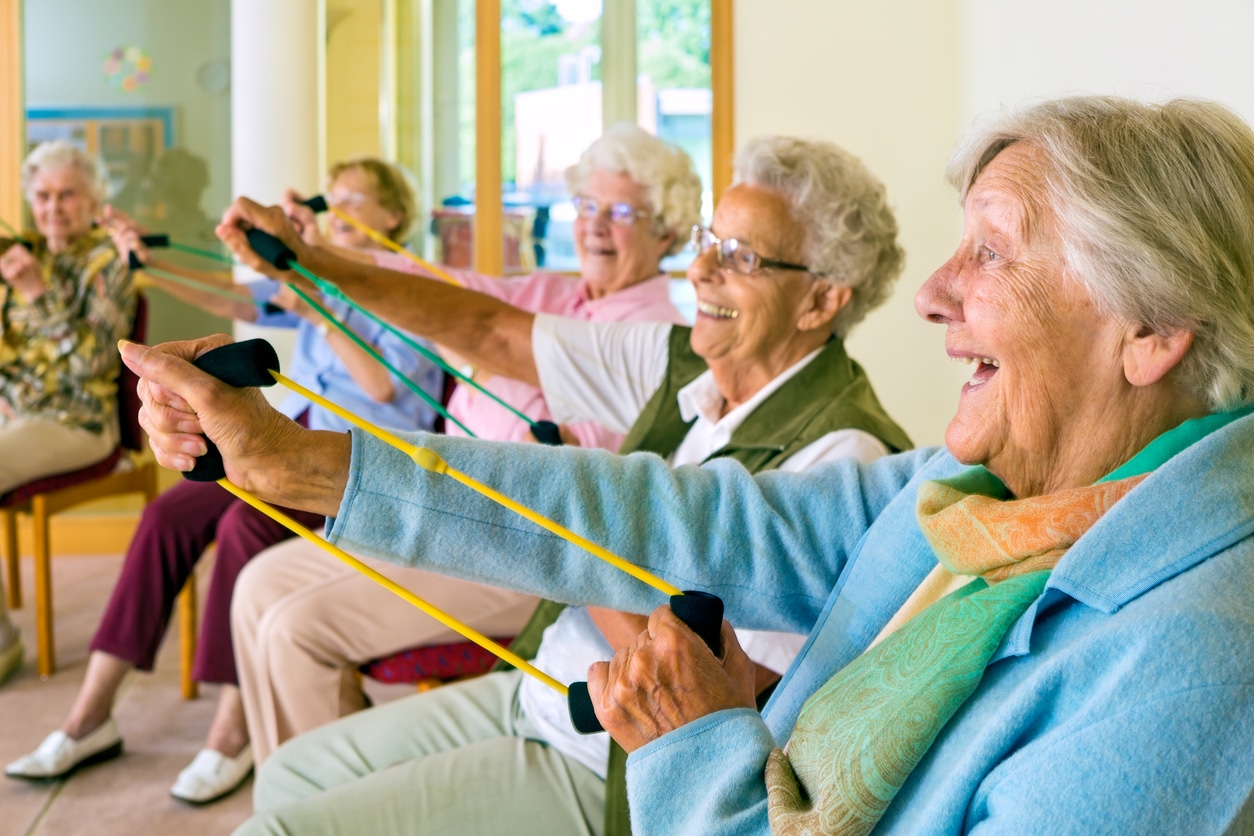Getting older may seem like a ticket to an easier lifestyle but one aspect should not be forgotten: exercise. Getting regular, age-appropriate exercise can mean the difference between a long healthy life and one that is fraught with illness and incapacitation. Although research is ongoing into the magic of exercise, here are a few things to know that can help motivate seniors to get off the couch and into the fitness center.
Exercise benefits and the heart and lungs
The heart and lungs work in tandem to process air and pump blood throughout the body and exercise can play an important role in keeping both functioning at optimum efficiency. According to the hopkinsmendicine.org article, “Exercise and the Heart,” exercise not only helps diminish the risk for heart disease it also strengthens the heart’s ability to pull oxygen from the blood which in turn makes pumping blood easier. In addition, the article notes that exercise reduces the release of stress hormones that increase the risk of a heart attack or stroke, and also helps to lower blood pressure.
Similarly, exercise has significant impacts on lung health. As noted in the lung.org article, “Exercise and Lung Health,” exercise increases the supply of oxygen to the lungs, and strengthens bones and muscles like the diaphragm that are required for breathing. Even those who struggle to get adequate exercise can help their lungs with breathing exercises like those described in the lung.org article, “Breathing Exercises.”
Exercise benefits and the brain
Although not a muscle, the brain also reaps benefits from exercise. For example, the neurosciencenews.com article, “Exercise and the Brain: The Neuroscience of Fitness Explored,” reveals researchers found that regular aerobic exercise can not only increase the size of the hippocampus (the memory center of the brain) but help to improve spatial memory and cognition. Exercise can also improve sleep, which is the time when the brain detoxifies and consolidates memory. Another helpful benefit is the increased release of the hormones norepinephrine and endorphins, which can boost happiness.
Exercise benefits and muscles
Since muscles hold the human body together and allow us to do pretty much everything, maintaining healthy muscles is essential to aging well. First of all, seniors need to be aware that, according to the mayoclinic.org article, “Strength training: Get stronger, leaner, healthier,” muscle mass decreases as we age, while, left unchecked, body fat increases. Luckily regular strength training can not only help build muscle mass and burn calories, but also strengthen bones, reduce symptoms associated with chronic conditions like arthritis back pain, and diabetes, improve thinking and learning, and increase overall quality of life.
Exercise benefits and bones
One of the most common conditions seniors can have is osteoporosis; the steady weakening of the bones that results in increased risk of fractures and fragility. Although everyone loses bone density as they age, osteoporosis speeds up that loss and is most common in women, especially after menopause. But, once again, exercise can help.
According to the my.clevelandclinic.org article, “Osteoporosis,” regular exercise will help to strengthen bones as well as all the attached muscles, tendons, and ligaments. This not only reduces the risk of osteoporosis but, in conjunction with prescribed medications, vitamins, and minerals, can improve bone health for those who have the condition. The benefits include greater mobility, strength, and stamina necessary for an active life. For a list of great bone exercises, check out the health.harvard.edu article, “The best exercises for your bones.”
Exercise benefits and mental health
While physical health benefits from exercise, so too does mental health. For seniors with mental health concerns like anxiety and depression, exercise is a great natural way to minimize negative feelings that detract from a full and happy life. As noted above, exercise enables the brain to release endorphins that increase pleasure, but also endocannabinoids which, according to the healthline.com article, “Exercise and the Brain: The Mental Health Benefits of Exercise,” work with endorphins to create the euphoria known as the “runner’s high.” In addition, exercise also increases the flow of dopamine, which is thought to influence memory, mood, sleep cycles, pain processing, and more.
How to exercise
Many seniors don’t get enough exercise simply because they don’t know which ones work for what. But the planetfitness.com article, “12 Exercises for Seniors: Balance, Mobility, and Strength,” is a good place to start. The key to maximizing benefits is to follow the Centers for Disease Control and Prevention guidelines that specify moderate-intensity exercise for at least 150 minutes a week with at least two days of strength training exercises.
Enjoy a full and active retirement at Ganton’s Countryside. For more information about Countryside, please call Margaret Nagel at (517) 206-5000 or download our brochure to learn about our care levels, cost, and amenities.


